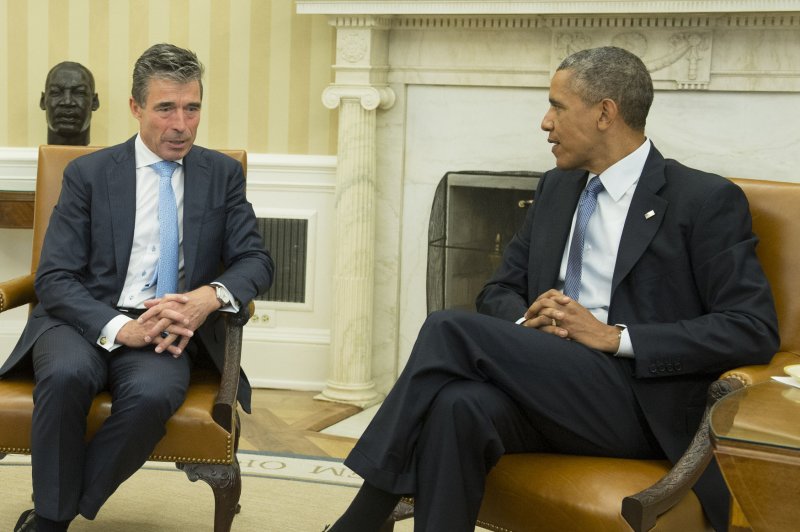President Barack Obama meets with NATO Secretary General Anders Fogh in the Oval Office at the White House in Washington, D.C. on July 8, 2014. NATO leaders will meet this week to discuss the appropriate NATO response to Russia. UPI/Kevin Dietsch |
License Photo
CARDIFF, Wales, Sept. 2 (UPI) -- NATO leaders are expected to consider the creation of a rapid response force for Eastern Europe in response to Russian actions in eastern Ukraine.
World leaders and NATO commanders will meet on Thursday and Friday in Wales to discuss a number of global security issues including the escalating crisis in Ukraine. Thie meeting takes place after Russia was accused of sending troops into Ukraine as part of what the West is calling an inexcusable breach of Ukraine's sovereignty and territorial aggression.
The force would include 4,000 NATO troops ready to deploy within 48-hours of receiving orders and would be supported by equipment and logistics pre-positioned in the Eastern European countries bordering Russia. It will also receive an upgraded schedule of military exercises and deployments in an effort to make a show defense and deterrence.
U.S. President Barack Obama will attend the summit, and according to his aides, the focus will be on the United States' commitment to NATO and the protection of its 28 members from any kind of territorial aggression.
"The tension you're seeing between Russia and the West is going to be put on display in Wales, and the president is going to be leading that effort," said Ivo H. Daalder, the former American ambassador to NATO and now head of the Chicago Council on Global Affairs, told the New York Times.
Before Obama attends the summit, he will stop in Estonia where the commitment to NATO security and protection is particularly resonant.
"The summit is very important because Russia thought it can change the borders of a sovereign European country by force, and this is happening not very far from NATO's borders," said Estonian Prime Minister Taavi Roivas. "The security situation has changed, and we need to rethink our plans and reinforce our allies, so we can be 101 percent sure that all member states are equally and strongly protected."
NATO is cautiously avoiding violation of the 1997 NATO-Russia Founding Act, an agreement where NATO promised Russia there would be no substantial establishment of forces in Eastern Europe.
Though Russia and Ukraine will be the main focus, NATO leaders are also expected to discuss the growing threat of the Islamic State (IS) and its advancement in Syria and Iraq.















